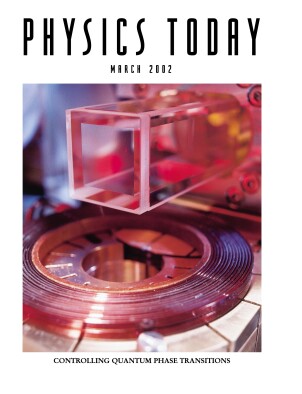Bohr Letters Clarify Mystery
DOI: 10.1063/1.1472388
The Niels Bohr Archive in Copenhagen has posted on the Web (at http://www.nba.nbi.dk
The Bohr family had intended to withhold these personal documents until 2012, the 50th anniversary of Bohr’s death. But as Finn Aaserud, director of the archive, puts it, the family has decided to release them now “to avoid possible misunderstandings regarding their contents.” The documents (some in two or three different versions) are displayed as facsimile originals, Danish or German transcriptions, and English translations.
The immediate impetus for Bohr’s first unsent letter, written soon after the 1957 publication of the Danish edition of Robert Jungk’s Brighter than a Thousand Suns, was the reproduction in that edition of a letter from Heisenberg to Jungk, giving his version of the 1941 meeting. “I am greatly amazed,” says Bohr’s unsent draft, “to see how much your memory has deceived you…. I remember every word of our conversations, which took place against a background of extreme sorrow and tension for us here in Denmark.”
In several of the drafts, Bohr recalls that Heisenberg was quite confident of German victory, and that he therefore thought it foolish for Bohr and other Danes to rebuff “German offers of cooperation.” Bohr also remembers Heisenberg saying that, under his leadership, “everything was being done in Germany to develop atomic weapons.” If the war lasted long enough, Heisenberg told him, atomic weapons might be decisive. And if they were, “how fortunate that would be for the position of science in Germany after the victory.”
All this is very different from Heisenberg’s repeated assertions, after the war, that he had come to Copenhagen in 1941 to ask Bohr to mediate a voluntary abstention from nuclear-weapons work by physicists on both sides, and that he never had any intention of giving Hitler an atomic bomb. In his unsent letters, Bohr does offer Heisenberg something of a face-saving excuse: “During the course of the war, such a wise person as yourself must gradually have lost faith in German victory…. I can therefore understand that perhaps at the end you may no longer have recalled what you thought and said during the first years of the war. But I cannot imagine that … you should have forgotten what arrangements [you had made] with the German government authorities.”

Draft of a letter from Bohr, congratulating Heisenberg on his 60th birthday in December 1961. The letter was never sent, though Bohr did send a congratulatory cable. Handwritten by Bohr’s wife Margrethe, this draft is part of the collection of private documents recently released by the Niels Bohr Archive.
NIELS BOHR ARCHIVE

More about the authors
Bertram M. Schwarzschild, American Center for Physics, One Physics Ellipse, College Park, Maryland 20740-3842, US .




